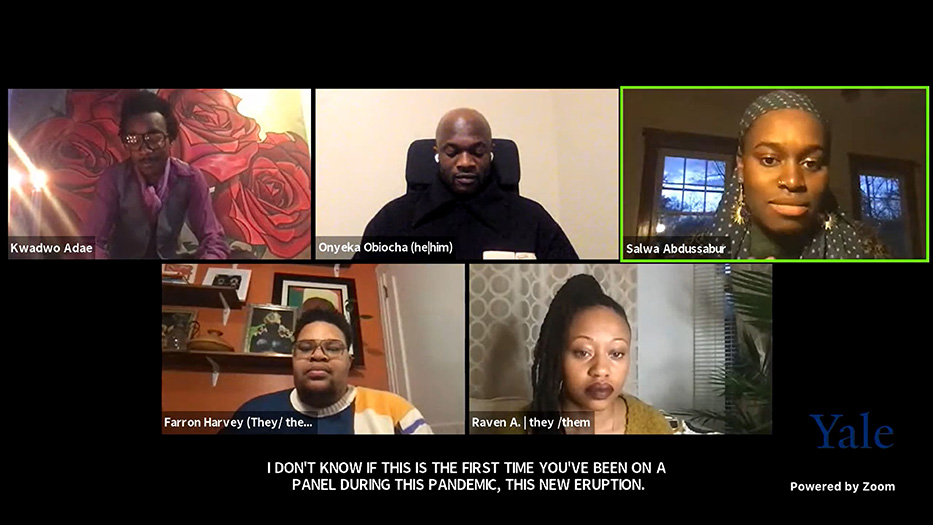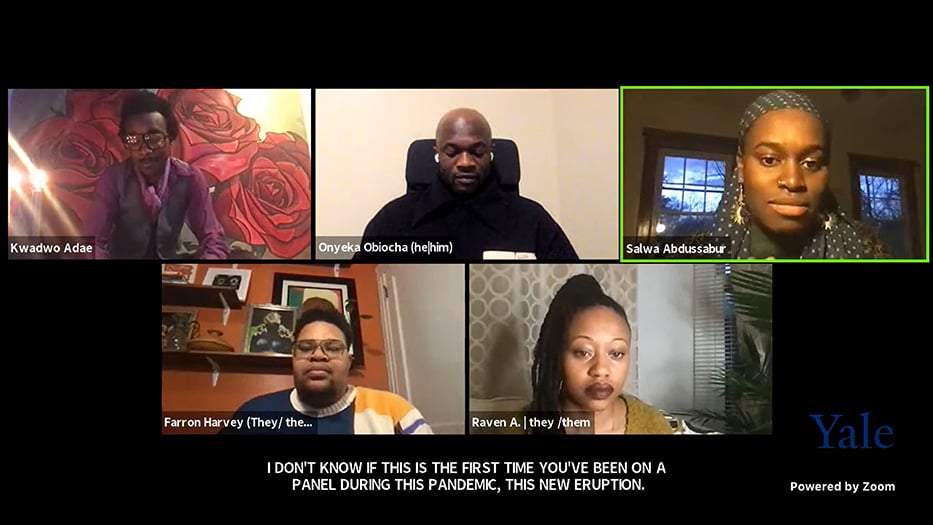
Dr. Martin Luther King Jr. | Kwadwo Adae | Raven Blake | Yale Peabody Museum

Panelists from "Triple A: Activation, Awareness, and Artivism". Top Row: Kwadwo Adae, Onyeka Obiocha, Salwa Abdussabur, Farron Harvey, and Raven Amandla Blake.
The pre-coronavirus times were never normal. Now, it’s time for artists and activists to stitch together a new “garment”—a new future—that does away with inequity, greed, and exploitation that has become normalized.
That idea comes from activist Sonya Renee Taylor, but it lived brightly in New Haven Monday night, as activists and artists gathered on Zoom to discuss “Triple A: Activation, Awareness, and Artivism.” The talk was part of the Yale Peabody Museum of Natural History’s 25th annual celebration of Dr. Martin Luther King, Jr., moved online due to Covid-19. A full lineup of recorded events is on the Peabody's Facebook page.
Moderator Salwa Abdussabur, a musician, community organizer, and creative director of the Black Haven Film Festival, kicked off the evening with a discussion of how members of the panel have been taking care of themselves amidst the pandemic. They asked them to reflect on the pervious year.
Farron Harvey, founder of Farron’s View and The Love Box, spoke about taking time for self-care as a political act, particularly while living under capitalism. They cited Audre Lorde’s famous quote, that "caring for myself is not self-indulgence, it is self-preservation, and that is an act of political warfare.”
“In being very clear this system does not care about folks especially Black folks,” they said. “So how am I living in a way that does not center capitalism and trying to prove my worth to white people.”
The sentiment resonated for CT-Core Deputy Co-Director and Love Fed New Haven Co-Founder Raven Amandla , who framed the pandemic as a masterclass in establishing boundaries. They reflected their history of organizing for Black lives before and during pandemic, which has included mutual aid efforts since last March.
“You can be out here organizing all the time and your health is literally declining,” they said. “But if you say Black lives matter, your life matters.”
The toll that organizing takes on activists' physical and mental health is well documented—and has been for years. In Taylor Branch’s biography of Martin Luther King, Jr., the autopsy revealed that at the young age of 39, he had “the heart of a 60-year old.”
.jpg?width=933&name=2021-01-19%20(4).jpg)
New Haven artist Kwadwo Adae spoke candidly about the mental calculation of wanting to do more public art for the community but having to take time to heal or protest to be able to return to that work in full capacity. He has also dedicated himself to the community’s wellbeing: week, he leads community members in mindfulness meditation through One Village Healing.
“You get used to it but none of us should have to calculate that cost,” he said. “I can give more to my community if I didn’t have to mitigate all of these different factors. I want to create for y’all.”
Abdussabur pivoted to address systemic inequalities across the nonprofit sector. They pointed to organizations that have begun to reckon with their historic anti-Blackness, including those that made promises in the wake of the state-sanctioned murder of George Floyd last summer. Since that time, very few have also announced funding and demonstrated action toward Black and BIPOC leadership on their staff or in their boardrooms.
Onyeka Obiocha, a managing director at Tsai CITY, slammed organizations for failing to meet the needs of their respective community members. He pointed to the 400,000 Americans who have lost their lives to Covid-19, a virus that is twice as likely to infect and kill Black Americans as their white peers.. In the U.S.—including New Haven—being Black has become a uniquely American comorbidity of the virus.
“I am so sad about the lives lost,” he said. “It is so overwhelming the way these institutions are showing their asses. A lot of way Black folks already know. We know these things don’t work for us, and now y’all see it too.”
Panel members all criticized the number of philanthropic institutions that have pledged their commitment to funding Black-led community work, but failed to follow through. Obiocha pointed to organizations or that have funded white-led organizations that profit from work done by Black organizations.
“Violence to me isn’t just shooting me,” said Obiocha. “ It is also intentionally not funding organizations that could help me. I feel that the organizations that want to be doing the work do not have the money.”
At the end of the conversation, the panelist discussed the role artists have played and will continue to play in imagining a new future. Amandla touched on the necessity for people to lean into their histories and remember citing, Alexis Pauline Gumb’s Undrowned: Black Feminist Lessons from Marine Mammals.
.jpg?width=933&name=2021-01-19%20(2).jpg)
“We can lean into the beauty of our existence that is so powerful,” they said. “We are the ones we’ve been waiting for, having conscious of how many ancestors led to you and your life coming into this world.”
Adae discussed his current artwork and the importance of creating work for himself, and activist work. During the winter months, he chooses to paint beautiful objects like flowers that are not directly related to the struggle.
“Whatever it is that you have, use it, it’s yours, and get better at it, perfect it, so you can share it because that is what it is for,” he said. “That’s why the gift was given to you.”
Abolitionists and artists are in conversation with one another as they are both imagining potential futures together, Obiocha added. Artists lean into their senses and explain futures where police is replaced by social workers or where oppression no longer exists for anyone
“I think artists play the crucial role of getting that information out into the world,” he said.

